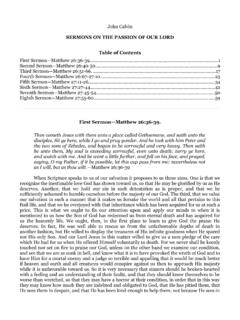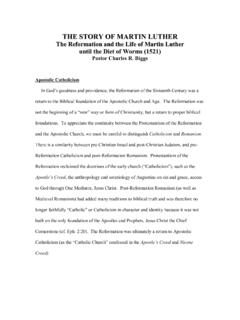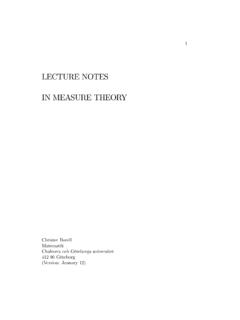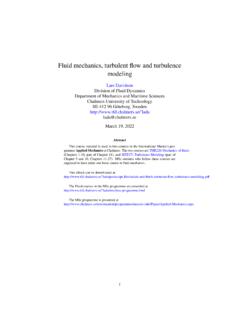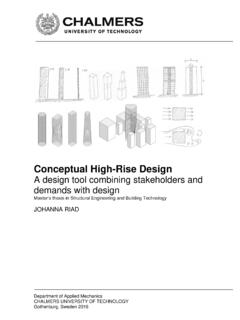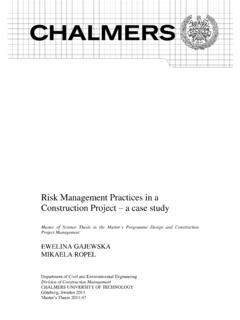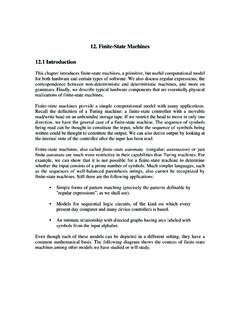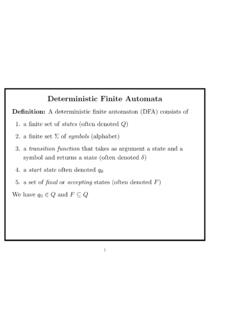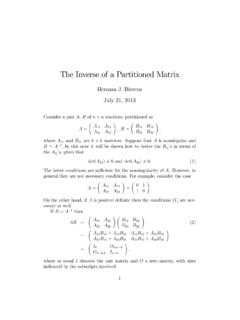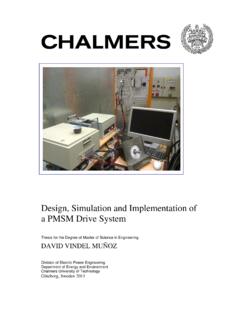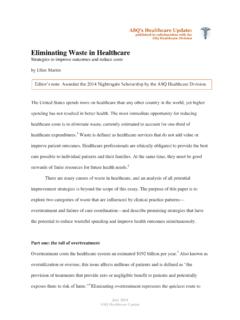Transcription of THE EXPULSIVE POWER OF A NEW AFFECTION
1 T h e E x p u l s i v e P o w e r o f a N e w A f f e c t i o n|1 THEEXPULSIVEPOWER OF ANEWAFFECTIONBy Thomas chalmers Love not the world, neither the things that are in the world. If any man love the world, thelove of the Father is not in him. - 1 John ii. are two ways in which a practical moralist may attempt to displace from the humanheart its love of the world- either by a demonstration of the world's vanity, so as that theheart shall be prevailed upon simply to withdraw its regards from an object that is notworthy of it; or, by setting forth another object, even God, as more worthy of its attachment,so as that the heart shall be prevailed upon not to resign an old AFFECTION , which shall havenothing to succeed it, but to exchange an old AFFECTION for a new purpose is to show, that from the constitution of our nature, the former method isaltogether incompetent and ineffectual and that the latter method will alone suffice for therescue and recovery of the heart from the wrong affectionthat domineers over it.
2 Afterhaving accomplished this purpose, I shall attempt a few practical may be regarded in two different firstis, when its object is at a distance, and then it becomes love in a state of secondis, when its object is in possession, and then it becomes love in a state ofindulgence. Under the impulse of desire, man feels himself urged onward in some path orpursuit of activity for its gratification. The faculties of his mind are putinto busy the steady direction of one great and engrossing interest, his attention is recalled fromthe many reveries into which it might otherwise have wandered; and the powers of hisbody are forced away from an indolence in which it else might have languished; and thattime is crowded with occupation, which but for some object of keen and devoted ambition,might have drivelled along in successive hours of weariness and distaste- and though hopedoes not always enliven, and success does notalways crown this career of exertion, yet inthe midst of this very variety, and with the alternations of occasional disappointment, is themachinery of the whole man kept in a sort of congenial play, and upholden in that tone andtemper which are most agreeable to , that if, through the extirpation of that desire which forms the originatingprinciple of all this movement, the machinery were to stop, and to receive no impulse fromanother desire substituted in its place, the man would be left with all his propensities toaction in a state of most painful and unnatural abandonment.
3 A sensitive being suffers, andis in violence, if, after having thoroughly rested from his fatigue, or been relieved from hispain, he continue in possession of powerswithout any excitement to these powers; if hepossess a capacity of desire without having an object of desire; or if he have a spare energyupon his person, without a counterpart, and without a stimulus to call it into misery of such a condition is often realized by him who is retired from business, orwho is retired from law, or who is even retired from the occupations of the chase, and ofT h e E x p u l s i v e P o w e r o f a N e w A f f e c t i o n|2the gaming table. Such is the demand of our nature for an object in pursuit, that noaccumulation ofprevious success can extinguish it- and thus it is, that the most prosperousmerchant, and the most victorious general, and the most fortunate gamester, when thelabour of their respective vocations has come to a close, are often found to languish in themidst of all their acquisitions, as if out of their kindred and rejoicing element.
4 It is quite invain with such a constitutional appetite for employment in man, to attempt cutting awayfrom him the spring or the principle of one employment, without providing him withanother. Thu whole heart and habit will rise in resistance against such an undertaking. Theelse unoccupied female who spends the hours of every evening at some play of hazard,knows as well as you, that the pecuniary gain, or the honourabletriumph of a successfulcontest, are altogether paltry. It is not such a demonstration of vanity as this that will forceher away from her dear and delightful occupatiou. The habit cannot so be displaced, as toleave nothing but a negative and cheerless vacancy behind it- though it may so besupplanted as to be followed up by another habit of employment, to which the POWER ofsome new AFFECTION has constrained her.
5 It is willingly suspended, for example, on anysingle evening, should the time that wont tobe allotted to gaining, require to be spent onthe preparations of an approaching assembly. The ascendant POWER of a second affectionwill do, what no exposition however forcible, of the folly and worthlessness of the first,ever could itis the same in the great world. We shall never be able to arrest any of its leadingpursuits, by a naked demonstration of their vanity. It is quite in vain to think of stoppingone of these pursuits in any way else, but by stimulating to another. In attempting to bringa worldly man intent and busied with the prosecution of his objects to a dead stand, wehave not merely to encounter the charm which he annexes to these objects- but we have toencounter the pleasure which he feels in the very prosecution of them.
6 It is not enough,then, that we dissipate the charm, by a moral, and eloquent, and affecting exposure of itsillusiveness. We must address to the eye of his mind another object, with a charm powerfulenough to dispossess the first of its influences, and to engage him in some otherprosecution as full of interest, and hope, and congenial activity, as the is this which stamps an impotency on all moral and pathetic declamation about theinsignificance of the world. A man will no more consent to the misery of being without anobject, because that object is a trifle, or of being without a pursuit, because that pursuitterminates in some frivolous or fugitive acquirement, than he will voluntarily submithimself to the torture, because that torture is to be of short duration. If to be without desireand without exertion altogether, is a state of violence and discomfort, then the presentdesire, with its correspondent train of exertion, is not to be got rid of simply by destroyingit.
7 It must beby substituting another desire, and another line or habit of exertion in itsplace- and the most effectual way of withdrawing the mind from one object, is not byturning it away upon desolate and unpeopled vacancy- but by presenting to its regardsanother object still more remarks apply not merely to love considered in its state of desire for an object notyet obtained. They apply also to love considered in its state of indulgence, or placidgratification, with an object already in possession. It is seldom that any of our tastes areT h e E x p u l s i v e P o w e r o f a N e w A f f e c t i o n|3made to disappear by a mere process of natural extinction. At least, it is very seldom, thatthis is done through the instrumentality of reasoning. It may be done by excessivepampering- but it is almost never done by the mere force of mental determination.
8 Butwhat cannot be destroyed, may be dispossessed and one taste may be made to give way toanother, and to lose its, POWER entirely as the reigning AFFECTION of the is thus, that the boy ceases,at length, to be the slave of his appetite, but it is because amanlier taste has now brought it into subordination- and that the youth ceases to idolizepleasure, but it is because the idol of wealth has become the stronger and gotten theaseendancy andthat even the love of money ceases to have the mastery over the heart ofmany a thriving citizen, but it is because drawn into, the whirl of city polities, anotheraffection has been wrought into his moral system, and he is now lorded over by the love ofpower. There is not one of these transformations in which the heart is left without anobject. Its desire for one particular object may be conquered; but as to its desire for havingsome one object or other, this is unconquerable.
9 Its adhesion to that on which it hasfastened the preference of its regards, cannot willingly be overcome by the rending away ofa simple separation. It can be done only by the application of something else, to which itmay feel the adhesion of a still stronger and more powerful preference. Such is the graspingtendency of the human heart, that it must have a something to lay hold of- and which, ifwrested away without the substitution of another something in its place, would leave avoid and a vacancy as painful to the mind, as hunger is to the natural system. It may bedispossessed of one object, or of any, but it cannot be desolated of all. Let there be abreathing and a sensitive heart, but without a liking and without affinity to any of thethings that are around it; and, in astate of cheerless abandonment, it would be alive tonothing but the burden of its own consciousness, and feel it to be intolerable.
10 It wouldmake no difference to its owner, whether he dwelt in the midst of a gay and goodly world;or, placed afar beyond the outskirts of creation, he dwelt a solitary unit in dark andunpeopled nothingness. The heart must have something to cling to- and never, by its ownvoluntary consent, will it so denude itself of its attachments, that there shall not be oneremaining object that can draw or solicit misery of a heart thus bereft of all relish for that which wont to minister enjoyment, isstrikingly exemplified in those, who, satiated with indulgence, have been so belaboured, asit were, with the variety and the poignancy of the pleasurable sensations they haveexperienced, that they are at length fatigued out of all capacity for sensation whatever. Thedisease of ennui is more frequent in the French metropolis, where amusement is moreexclusively the occupation ofthe higher classes, than it is in the British metropolis, wherethe longings of the heart are more diversified by the resources of business and are the votaries of fashion,who, in this way, have at length become the victims in whom the very multitude of their enjoyments, has at lastextinguished their POWER of enjoyment- who, with the gratifications of art and nature atcommand, now look upon all that is around them with an eye of tastelessness- who, pliedwith the delights of sense and of splendour even to weariness, and incapable of higherdelights, have come to the end of all their perfection, and like Solomon of old, found it to bevanity and vexation.

